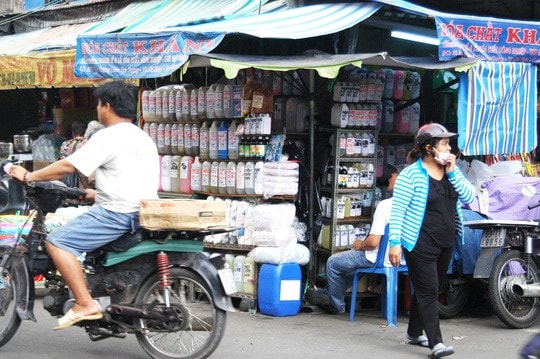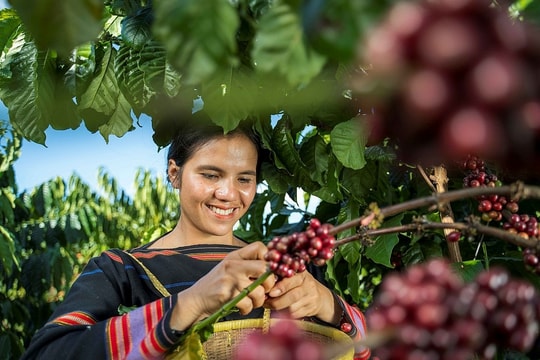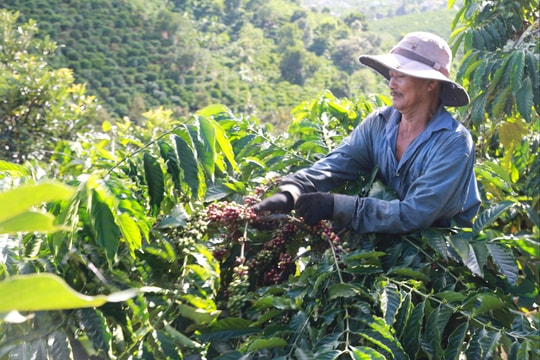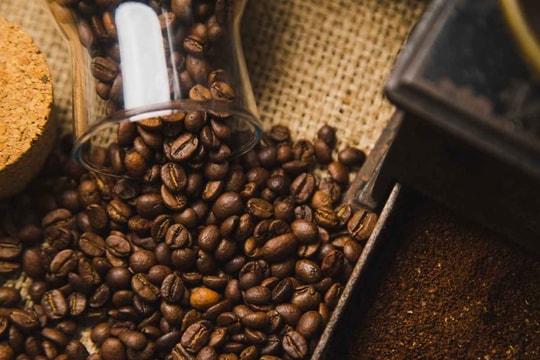Super strong coffee disrupts the market
Super strong coffee is essentially chemicals labeled, canned and openly advertised online, posing many potential dangers.
Flavorings that create the exact same smell as Robusta, Moka, Brazil coffee… are being openly sold everywhere and online. The thing is that the price of this thick coffee is very cheap, advertised by the seller as super profitable, with a return of up to forty!
Super cheap price, super easy to buy
At Kim Bien market (District 5, Ho Chi Minh City) and on the streets near this market area, there are hundreds of stores selling chemicals and flavorings for food. Notably, chemicals, flavorings, and coffee colors without labels, expiration dates, and origins are openly sold.
 |
Chemicals and food flavorings are sold everywhere at Kim Bien market, including "super strong coffee".
According to the owner of a shop in Kim Bien market, every day the shop sells thousands of liters of chemicals and flavorings, including the product "8X super concentrated coffee" with the slogan: "super profitable, super convenient". The owner of this shop always enthusiastically guides buyers on how to make it and even... business methods; such as selling at bus stations, school canteens, hospitals, sidewalks, night markets... "Just put a little thick coffee in a cup, add a lot of ice and stir well. Even if the customer is a "saint", he still won't be able to distinguish between real and fake!", the shop owner revealed.
The price of raw materials for strong coffee is also very uncertain. Khanh chemical store on Van Tuong street (Kim Bien market) sells super strong coffee with all kinds of flavors, priced from 380,000 VND/liter to 1.2 million VND/can. Customers who need it can buy the whole can, not retail. Less than 50 meters away, Anh Hong chemical store sells all kinds of chemicals and food flavors.
“If you want to do business with filter coffee or pre-brewed coffee, the store has enough products to supply,” said an employee named Vuong. This person also gave detailed instructions: “If you want to brew pre-brewed coffee, you should buy strong liquid coffee, mix in about 2%-5% is enough, more will make it smell strong. If you want to brew coffee with a filter, use powder, mix it into the coffee for customers, no one will know.”
Not only in Ho Chi Minh City, thick coffee has also been available in many localities, including the "coffee capital" Buon Ma Thuot (Dak Lak). In the role of a new shop owner, we went to a grocery store on Hoang Dieu Street (Buon Ma Thuot City) to ask to buy "essence" of coffee. The seller enthusiastically said: "There are many types here; from aroma-creating forms, thicknesses to instant drinks, we have everything."
This person explained the brewing method quite similar to the instructions of the chemical stores at Kim Bien market: "Just put a little flavoring into the filter to have a cup of fragrant, thick coffee. For instant coffee, add a few drops into a glass of water, and you will have a delicious cup of coffee." According to our observations, the price of raw materials for thick coffee in Dak Lak, powder type, is about 50,000 VND/100g, bottle type is 400,000 VND/liter.
2 liters = 320 cups of coffee
It is from the source of chemicals and flavorings that create thick coffee that are sold everywhere, because of greed, online businesses buy and resell to sidewalk coffee sellers, "toad" coffee, school canteens, hospitals, and public places. To attract more buyers, someone set up a "Kim Bien Chemical Store" on Facebook, advertising with flattering words: "Super profitable ready-to-drink concentrated coffee 8X reappears in the world". According to the instructions of this store, each 2-liter pot of thick coffee will produce 16 liters of coffee and can make 320 cups. With the price of 380,000 VND/2 liters, the capital investment is less than 1,000 VND/cup, the profit is... needless to say!
The representative of this Facebook page also boasts that there are many types and flavors that create the same smell as Moka, Robusta, Brazil coffee... with online prices ranging from 150,000-380,000 VND/bottle of 2 to 5 liters. Customers who want to order delivery within the city must buy at least 5 bottles or more. "If you buy 5 bottles, you will get free delivery, so you can sell them anytime without any time limit...", this person said.
Faced with the appearance of this toxic coffee, many businesses and branded coffee shops expressed their indignation. Ms. Nguyen Thu Phuong, a reputable coffee shop owner on Hong Bang Street (District 5), worried: “To have 5 liters of real coffee, it costs at least nearly 3 million VND for raw materials. So 5 liters of pure pre-mixed coffee for only a few hundred thousand VND is too cheap. That means they must have used chemicals that are harmful to health and create unhealthy competition, affecting the reputation of coffee brands.”
Managing chaos
A representative of the HCM City Plant Protection Department said that there are currently 95 coffee production facilities in the city; mainly roasting, grinding and packaging. Of these, 92 facilities have been inspected by the department and granted food safety and hygiene certificates.
 |
According to the process, after having this certificate, the coffee production facility must go to the City Food Safety Department to register for quality declaration procedures and only when the certificate of acceptance of declaration is granted can the product be sold to the market.
“Depending on the business goals, there are establishments that declare 100% natural coffee or mix 10% soybeans, 5% corn or use additional flavors such as coffee flavor, cocoa flavor... During the production process, establishments must comply with their declaration and periodically take samples at least twice a year to send for testing to prove the quality is as declared. After the product is circulated on the market, if the authorities take samples for testing and detect a caffeine content of less than 1%, they will be heavily fined,” emphasized the representative of the City Plant Protection Department.
That is about the registration process, announcing the quality of food safety and hygiene according to regulations, but in reality, the management and prevention of this type of chemical coffee is confusing, which can create many loopholes. Mr. Tran Ngoc Thanh, Head of the Department of Agricultural, Forestry and Fishery Product Quality Management - Department of Agriculture and Rural Development of Dak Lak province, said that according to regulations, the inspection of coffee flavoring and additives belongs to the health sector.
Meanwhile, Mr. Tran Van Tiet, Deputy Head of the Food Safety Department - Dak Lak Province Department of Health, said that the department only manages two establishments selling food additives in Buon Ma Thuot City, while establishments selling mixed products with many other types of goods are not under the authority of the department but under the authority of the industry and trade sector. More specifically, the inspection of stores selling general goods is carried out by the market management agency of the Department of Industry and Trade.
However, according to Mr. Nguyen Dao Chi, Deputy Head of the Market Management Department under the Department of Industry and Trade of Dak Lak province, the function of market management is to check invoices and documents of goods, while product quality belongs to the Food Safety Department and the Department of Agricultural, Forestry and Fishery Product Quality Management - Department of Agriculture and Rural Development.
Chemical mixing is a concern.
Dr. Lam Quoc Hung, Head of the Poison Control Department of the Food Safety Department - Ministry of Health, said that during the production process, it is completely normal to increase or decrease the ingredients to increase the taste and fat content of coffee, but the most worrying thing is the mixing of chemical ingredients to create bitterness, richness, color and stimulants to deceive users into thinking that the product is real coffee. To know whether the thick coffee as reported by the press is toxic or not, it cannot be assessed by senses but must test the ingredients in the product. Currently, this product is managed by the Ministry of Industry and Trade.
According to Dr. Hung, caffeine in coffee is a mild stimulant that helps increase alertness and concentration. However, abusing coffee to stimulate, trying to work when the body is tired and sleepy can have negative effects on the cardiovascular system, increasing the risk of stroke.
According to Zing.vn
| RELATED NEWS |
|---|








